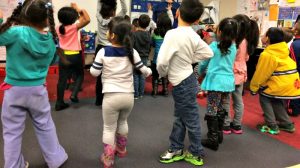When we learned that Wolf Trap would be doing a one-week residency at our school, I was excited because I had participated in several of their workshops in Virginia at the national Turnaround Arts retreat last summer. Finally my colleagues were going to experience what I had been telling them about.
Wolf Trap is a nationally recognized leader in the field of arts education. Its Institute for Early Learning Through the Arts trains teachers through residencies and workshops “to use performing arts techniques to enhance instructional practice and achieve curriculum goals set for young children. The focus is on essential areas such as math, language arts, performing arts fundamentals, critical thinking, and collaboration.”

To prepare for our residency, the kindergarten/transitional kindergarten team came up with an overarching theme/academic struggle for the week. After much dialogue, we agreed to focus on questions related to reading comprehension: How do we begin to help young children make strong inferences about character? How do we help young students understand story setting, and how does story setting play an important role in the events that take place in a story?
We were fortunate to have Melissa Richardson as our weeklong resident artist. She specializes in theatre and storytelling and guided us with making stories come alive in our classrooms through drama. Her energy, creativity, and expertise were infectious for both the students and participating teachers. She capitalized on young children’s energy and natural willingness to explore to guide them to a deeper understanding of story characters.
Students acted out important story elements by embodying the character through physical actions, vocal exercises and performing dialogue. There were points in the week where Melissa stepped back and allowed the students to take ownership of their story re-enactments. Students even invented their own dialogue to demonstrate their understanding of character, plot and setting.
Melissa also brought the story’s setting to life through “coffee can theater,” a strategy that uses toys and small props to help students activate their imaginations. The props made an abstract concept like setting concrete and relevant to the children.
Throughout the week, students explored and learned through their own creativity, and so did all of the participating teachers. At the end of each day, we gathered with Melissa to review the strategies she demonstrated in our classrooms and practiced a few others.
As a result, our kindergarten/transitional kindergarten teachers have already begun to explore story drama more regularly with our students. I feel very fortunate to have been given the opportunity to immerse ourselves in this weeklong residency.
